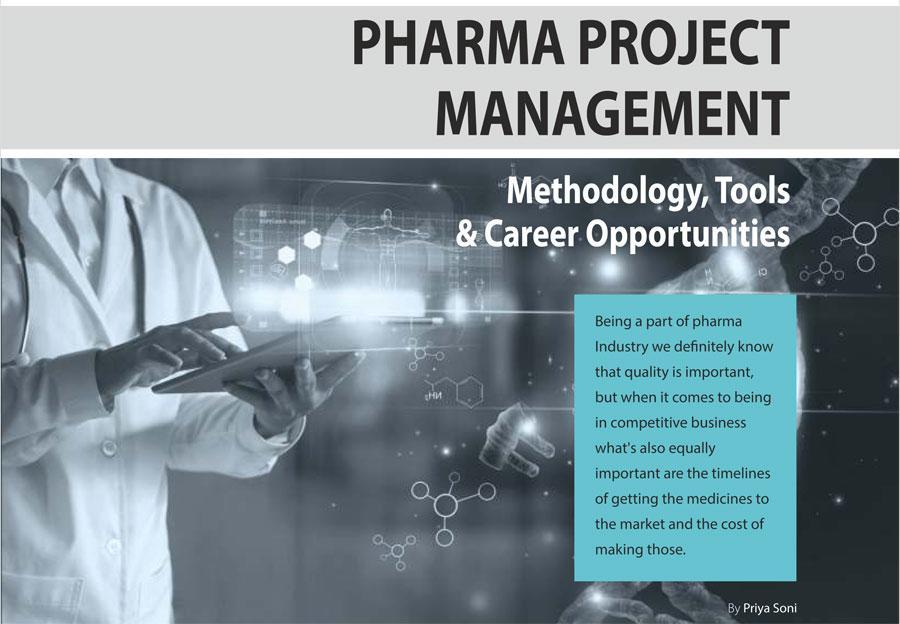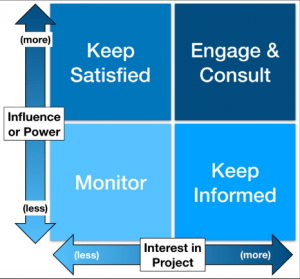
From launch of new vaccine or a new drug molecule to filling a generic product, from installation of a new machinery set-up within a plant to digitalization of existing one, from operational improvement in processes to a culture change campaign, there are multiple unique one time activities in pharma industry that calls for focussed and structured approach. That’s when Project Management comes into play.
Higher “first to market” competition in developing generic drugs, more stringent regulatory requirements, increasing research and development (R&D) costs for innovative new drugs and uncertainty around known and unknown risks make project management in pharmaceutical industry even more critical.
The tools and methodology of project management, ensures project success and reduces the risks. In this article we will touch base upon some of these tools and methodologies. Bonus – we will also look at project management related certifications and when and how to make a successful career in project management. So if you want to get some useful insights on project management, make career in it or guide someone into it, you must read further.
Aspects to consider before you start a project
There are some important checks, before you even begin a project. Although project management methodology can be applied to almost all your routine tasks, not everything should be run as a project as it requires a lot of resources and time. A project is temporary, unique and output oriented. A firm runs a task as a project or on project level when there are high stakes involved because that’s when you can’t afford to fail.
And then there are some other project ‘pre’- initiation checks to ensure when you start a project it is successful. This is also sometimes called as the feasibility study to understand whether this particular project is a right thing to do. In pharma manufacturing industry even before validation studies, we conduct feasibility study to know firsthand about a product and how will it come up. You must understand on a higher level – Communication, company mission, policy and leadership, organizational structure, processes, environmental factors, stakeholders and project deliverable.
Success of a project depends on many factors. It’s a good idea to understand them, before initiating a project. Here’s a list:
Company Mission & Policies: Know and understand them, and ensure you are in alignment with them. For example, if the company believes in sustainable manufacturing and you come up with a project of cheaper alternative vendor who does not manufactures sustainably, the project may fail later.
Leadership & its priorities: If your project or its outcome is not on the leadership priority board, except a slow response or extra efforts in getting the things moving. For example, if you suggest a high cost project when the site is already under financial crunch, it may not be well supported by leadership. This may mean longer times or more resources or even less recognition.
Organizational Structure: There are various organizational structures, but the idea is to understand where your position in the organization is, and what authority and support you will have. Knowing and understanding it first will prevent unpleasant surprises later.
Processes & Corporate Knowledge: Get a thorough understanding of processes and corporate knowledge related to project area.
Environmental Factors: Organizational culture, human resource, market etc. play a crucial role. For example, you can run a highly innovative project in a highly conservative culture. You need to moderate your intensities in this case.
Project Deliverables: The MOST IMPORTANT aspect. If you are entrusted with a project, ensure you clearly understand them as clearly as possible. Even better, if you can quantify your goals. I have observed many people jumping the gun and getting into a project and later struggle with the deliverable.
Stakeholders Identification: Identify them and have a strategy to keep them informed/involved/updated.
Triple Constraints: Other than this, it’s important to understand the triple constraints involved in any project – Time-Money-Quality. Change in any one of these constraints can affect the other. Trade-offs which may be required to do later in project are managed well be considering these constraints. Set correctly in the beginning they help in a successful project. I well planned project is the one, that trikes the right balance between these constraints. And who guides to you the right balance- that’s your customers- weather internal or external. Look for the voice of customer and decide accordingly-what what of the three is a priority for your customers.
Steps in Project Management
Once you have checked it and you are ready to start a project, here are the steps to keep in mind:
Project Initiation
- Develop a project Charter: It’s a summary of your entire project. Clearly write down the deliverables, goals, team members, timelines and other details. Be realistic and follow it diligently. Get it signed off, for better adherence. Your goals must be SMART – Specific, measurable, attainable, realistic and time-bound.
- Identify key stakeholders: Once you identify the stakeholders, you can prepare a management strategy for them.
Project planning (a big step)
- Develop project plan: Make a WBS (Work based structure), a detailed break-up or tasks. Useful tools: PERT/CPM (critical Path Method) and Gantt.

Image 1: Gantt Chart
Image credits: Timelinemaker.com

Image 2: PERT chart/CPM
Image credits: Stitchdiary
- Plan cost and quality management: Cost estimation can be done top-down or bottoms up. Useful tool: PERT/CPM. The quality not to mention is customer centric.
- Plan team and stakeholder management: Some useful tools can be – Control-Impact Matrix & RACI matrix.

Image credits: theprojectmanagementblueprint.com
- Plan communication and risk management: Useful tools- FMEA (Failure Mode Effect Analysis) or the RPN (Risk Probability Number).
Project Execution
- Direct and manage the project: Follow-up on tasks and facilitate to remove any hurdles the team faces.
- Perform Quality Assurance
- Acquire, develop and manage team: A very important activity. Every team formation goes through various stages of Forming Storming Norming Performing. The sooner the team bonds the quicker will you get results.
Manage everything else you planned in planning phase.
Project Monitoring & Control
- Monitor schedule and quality: Suitability is the key here. Ensure you have checks and balances for the same. Useful methodology: Poke-Yoke.
- Risk and cost: The risks identified in planning process must be monitored. Removed/mitigated wherever possible. Cost is one of the most important factors in projects. Needs to be closely monitored.
- Procurement: Procurements have to be tracked closely. Cross-functional meetings may be required with technical and non-technical departments for the same.
PS: Plan of how to monitor, it comes from ‘PLAN’ phase.
Project Closing
When everything is under control, verify the project charter and you can close it with supporting evidences and preferable with a sustainability plan.
Aspects to consider before you start a project
There are some important checks, before you even begin a project. Although project management methodology can be applied to almost all your routine tasks, not everything should be run as a project as it requires a lot of resources and time. A project is temporary, unique and output oriented. A firm runs a task as a project or on project level when there are high stakes involved because that’s when you can’t afford to fail.
And then there are some other project ‘pre’- initiation checks to ensure when you start a project it is successful. This is also sometimes called as the feasibility study to understand whether this particular project is a right thing to do. In pharma manufacturing industry even before validation studies, we conduct feasibility study to know firsthand about a product and how will it come up. You must understand on a higher level – Communication, company mission, policy and leadership, organizational structure, processes, environmental factors, stakeholders and project deliverable.
Success of a project depends on many factors. It’s a good idea to understand them, before initiating a project. Here’s a list:
Company Mission & Policies: Know and understand them, and ensure you are in alignment with them. For example, if the company believes in sustainable manufacturing and you come up with a project of cheaper alternative vendor who does not manufactures sustainably, the project may fail later.
Leadership & its priorities: If your project or its outcome is not on the leadership priority board, except a slow response or extra efforts in getting the things moving. For example, if you suggest a high cost project when the site is already under financial crunch, it may not be well supported by leadership. This may mean longer times or more resources or even less recognition.
Organizational Structure: There are various organizational structures, but the idea is to understand where your position in the organization is, and what authority and support you will have. Knowing and understanding it first will prevent unpleasant surprises later.
Processes & Corporate Knowledge: Get a thorough understanding of processes and corporate knowledge related to project area.
Environmental Factors: Organizational culture, human resource, market etc. play a crucial role. For example, you can run a highly innovative project in a highly conservative culture. You need to moderate your intensities in this case.
Project Deliverables: The MOST IMPORTANT aspect. If you are entrusted with a project, ensure you clearly understand them as clearly as possible. Even better, if you can quantify your goals. I have observed many people jumping the gun and getting into a project and later struggle with the deliverable.
Stakeholders Identification: Identify them and have a strategy to keep them informed/involved/updated.
Triple Constraints: Other than this, it’s important to understand the triple constraints involved in any project – Time-Money-Quality. Change in any one of these constraints can affect the other. Trade-offs which may be required to do later in project are managed well be considering these constraints. Set correctly in the beginning they help in a successful project. I well planned project is the one, that trikes the right balance between these constraints. And who guides to you the right balance- that’s your customers- weather internal or external. Look for the voice of customer and decide accordingly-what what of the three is a priority for your customers.
Career in Project Management
If what you read so far sounds interesting and you want to understand insights on career in project management, here are some thoughts:
You can choose to opt for project management anytime in your career. The most successful Project Mangers that I have seen have switched field to project management after gaining some experience (5-6 years) in related field. For example, to be a Project Manager in new launches, it’s great to have some technical R&D experience. However there is no thumb rule to it, but I believe core technical knowledge really helps. The whole point is the more width/and depth of knowledge you have the better can you manage the projects.
Of course, technical knowledge is not enough. Project management essentially requires other soft skills – analysing and solving problems, strong stakeholder management, clear communications, creative thinking are some to name.
Last but not the least, technical skills of project management are a must, without which it will all be hit and trial. How to decide on timelines, budget, team, deliverables, risks, etc.
Starting a job in project management can be exciting, but it can be really tough without the subject knowledge. If you are seeking to enter in the field of project management, certain certifications can give you more preference over other candidates in the eyes of the recruiters. Many organizations in fact have some of these certifications as pre-requisites. So it’s important you know about it.
While there are plenty of sources – both online and classes from where you can get to learn about it, you can more easily convince a potential employer about the knowledge on project management by obtaining project management certifications. Talking of knowledge, the most well recognized is the PMBOK – the Project Management Body of Knowledge, by PMI-Project Management Institute. PMBOK is acceptable for PRINCE2 as well. If you really want more insights on project management you can buy this book (costly one). Buying and reading a book is not mandatory and also is not enough. There are other criteria for qualification too.
When you successfully meet the assessment criteria of PMI, you become a PMI certified PMPProject Management Professional.
Now while PMP is knowledge-based, PRINCE2 methodology is process-based certificate. PMI basically is US based, PRINCE2 is owned by HM Cabinet Office, UK.
In general, the UK and Australia prefer PRINCE2, and the US and American countries prefer PMP. Asia, Africa and the Middle East area have no strong preference for PMP or PRINCE2.
PDUs (Professional Developmental Units) are one-hour blocks of time that you spend learning or teaching. Certain number of PDUs are necessary for PMP & Prince Certifications. Other important certification is in Agile Project Management, which is very much in demand and as agile is a new way of working.
Big question – Can one do Project Management without being certified? ABSOLUTELY YES. All it takes is a right combination of knowledge and skills.
Final Remarks
Project management provides many useful tools and methodologies for delivering desired results, within stipulated time period and budget. Without project management, teams and customers – internal or external, are exposed to chaotic management, frequent changes, unclear objectives, a lack of resources, unrealistic planning, poor quality of project deliverables, projects going over budget and delivered late.
Project management creates and enables motivated teams who know their work matters, so do their best work. And that project management enabled team ensures the right goals and objectives are achieved, that delivers real return on investment. Looking at the increasing competition with respect to cost and timelines in pharma industry, it is important we understand the important of project management methodologies and the competitiveness it can bring.
About the Author
 Priya Soni is a Project Management and Operational Excellence Professional, with more than a decade of versatile experience in pharmaceutical field. She has a dual Master degree in Pharmacy and Business Management and is a Lean Six Sigma Black Belt certificate holder. She is associated with a research based pharma giant and has worked with companies like Mylan, Dr. Reddy’s Lab and Apotex, in past. She shares her knowledge on project management and other related useful topics on Linked-in profile with name Priya Soni Pandit.
Priya Soni is a Project Management and Operational Excellence Professional, with more than a decade of versatile experience in pharmaceutical field. She has a dual Master degree in Pharmacy and Business Management and is a Lean Six Sigma Black Belt certificate holder. She is associated with a research based pharma giant and has worked with companies like Mylan, Dr. Reddy’s Lab and Apotex, in past. She shares her knowledge on project management and other related useful topics on Linked-in profile with name Priya Soni Pandit.
IMA Exclusive
![]() An exhaustive coverage of the world leader in the design and manufacture of automatic machines for the processing and packaging of pharmaceutical products. Wide portfolio of machines and the ability to offer tailor-made solutions to satisfy the most sophisticated requests in the market are the biggest strengths of IMA.
An exhaustive coverage of the world leader in the design and manufacture of automatic machines for the processing and packaging of pharmaceutical products. Wide portfolio of machines and the ability to offer tailor-made solutions to satisfy the most sophisticated requests in the market are the biggest strengths of IMA.









